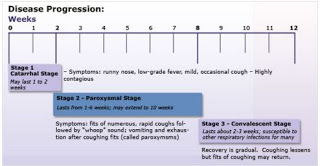87 cases of whooping cough reported in Kentucky during the last five months of 2015; best prevention is vaccination

 |
| Image from the CDC; click on it for a larger version |
Whooping cough is a highly contagious respiratory disease caused by bacteria transmitted by droplets from sneezing, coughing or close contact. Infected people are most contagious up to about two weeks after the cough begins.
Early symptoms of whooping cough look like a common cold, including runny nose, sneezing, mild cough and low-grade fever. After one to two weeks, long coughing spells develop, which often occur in explosive bursts, sometimes ending with a high-pitched whoop and vomiting. This can go on for up to 10 weeks or more, according to the federal Centers for Disease Control and Prevention.
Vaccination is the best way to prevent the spread of whooping cough, according to the CDC.
Whooping cough can cause severe or life-threatening complications in infants who are too young to have been fully vaccinated, making it especially important for those who care for them to be up-to-date on their immunizations.
“About half of babies younger than 1 year old who get pertussis need care in the hospital, and one out of 100 babies who get treated in the hospital die,” says the CDC.
Infants are recommended to receive their first dose of pertussis vaccine, in combination with diphtheria and tetanus, at 2 months, 4 months and 6 months of age. Boosters are given as early as 12 months through 18 months and then around age 4 or 5. Older children and adults are encouraged to get a pertussis booster called TDaP.
“It’s important for communities to work together to control the spread of the disease,” Dr. Kraig Humbaugh, senior deputy commissioner at the state health department, told The Courier-Journal. “Developing community-wide immunity through vaccination is an important strategy for pertussis control. We strongly encourage those who haven’t done so to get an adolescent or adult pertussis booster vaccine.”
“Though anyone can get whooping cough, the illness can be particularly dangerous for pregnant women, infants younger than 12 months and anyone with a pre-existing health condition that could worsen with a severe cough,” the Louisville newspaper reports.
More information about whooping cough can be found at www.cdc.gov/pertussis.